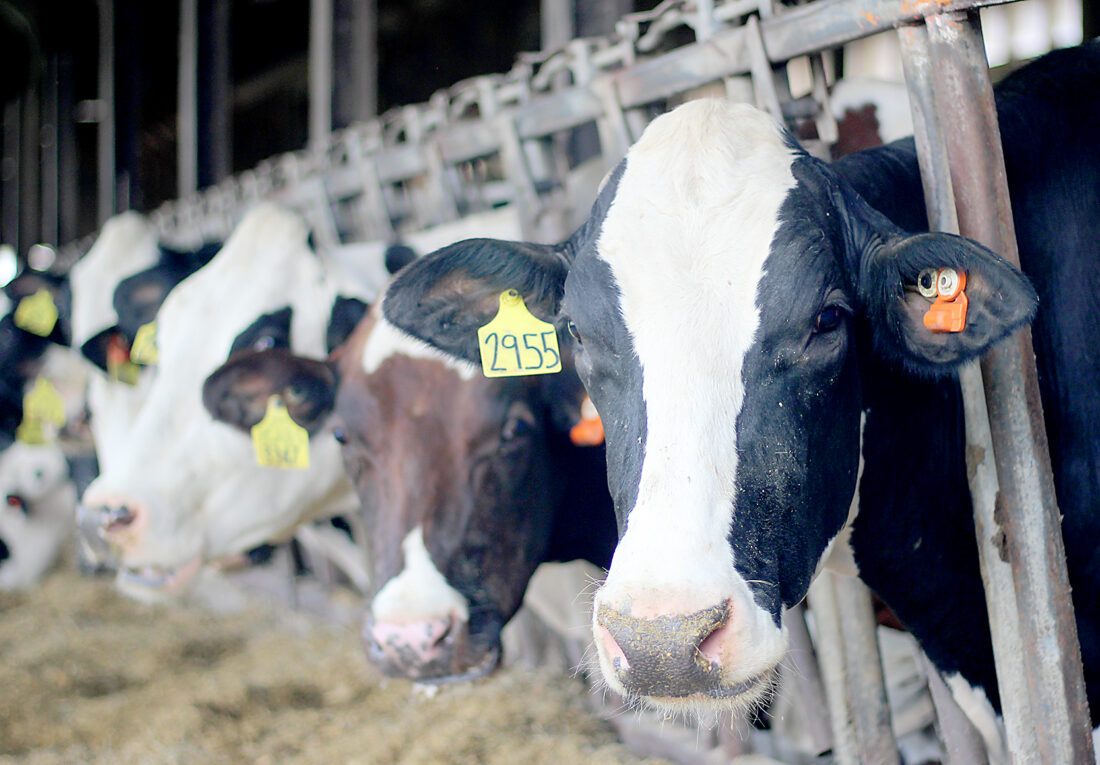
Dairy cows wear their ear tags while eating feed at Vale Wood Farms in Loretto.
Mirror photo by Colette Costlow
About 4,000 farms operate in Blair, Bedford, Cambria, Clearfield, Centre and Huntingdon counties and when it comes to technology in the workplace, these farms have been adapting and adopting new ideas for centuries.
At Vale Wood Farms in Loretto, Carissa Itle Westrick, director of business development, said her great-grandfather
was using groundbreaking technology in the 1930s — refrigeration and pasteurization.
Although today’s technology looks different, the refrigeration and pasteurization concept was a breakthrough that allowed farmers to keep milk safe for consumption and transport it longer distances.
“A lot of people don’t think about that being technology, but in the 1930s, that was a big deal,” she said. “We’ve always been willing to adapt to some kind of technology.”
Today, some of Vale Wood’s newest technology can be held in the palm of your hand and clipped on the ear of a dairy cow.
Activity monitors, clipped on the ear, track a dairy cow’s health. The trackers monitor the animal and the data shows up on their computers, Westrick said.
The tracker will alert farmers to unusual activity, so they can “be sure to pay attention to that cow and make sure that she gets the extra care that she needs,” Westrick said.
Technology acts as an “extra person” to monitor some areas on the farm, Westrick said.
To improve their farm and dairy herd, Westrick said they “have to take advantage of technology.”
Equipment tech
Equipment companies have integrated new technology into their products, making them “easier to use and time saving,” for regional farmers like Chris Harner.
Harner Farm, in State College since 1945, started out as an apple orchard, but now they’ve grown into offering sweet corn, pumpkins and gourds.
In the past, the farm used three vacuum seeders to plant. Now, they use one.
“It was state-of-the-art 15 years ago,” he said of the equipment, noting its use has changed “a few things around” with their farming process, making some work easier, a little less expensive and less time consuming.
The Bedford Farm Bureau Co-op recently purchased a large drone that helps detect how much bushel increase the farm will have that season, general manager Jay Miller said.
They also installed a feed mill with precision mixture accuracy — that can be controlled from their computer at home — at their Curryville location.
As a result, the feed mill has “increased our production with less overhead,” Miller said.
If there is a new piece of technology, he said the co-op will see if that machine can increase production numbers, and they will purchase it if the machine isn’t too pricey.
New farming technology translates to “money in the farmers’ pockets,” he said.
Posts and likes
Social media has helped Pine Grove Nursery & Lawncare with advertising their trees, pumpkins and events, said co-owner Scott Way.
Way and his sons Isaak and Braylon purchased the Clearfield County nursery in 2023, also inheriting the farm’s Facebook page. Way said his sons want to take social media one step further with a TikTok account.
They drew inspiration from another TikTok account that aims to educate the public about what farming life looks like. “That’s what we’re looking to do,” Way said.
“Education is a big thing,” he said. “Letting people know what you do and how you do it is big to have people understand what farming is all about.”
Their online platform connects them with other farms as well, building relationships both on and off the screen. Way said he shares posts from several farms, and in return, they will share his “so more people get to see (events) that way.”
As for Vale Wood Farms, Westrick said they feel a “responsibility” to make a connection between cows and customers.
She said when people visit the farm, they can understand where the milk they drink is made, which is “the story we try to enforce through pictures.”
Vale Wood has 26,000 Facebook followers, she said, noting the social media platform brings more people into their events. “It’s the easiest way for us to reach our consumers directly,” Westrick said.
Blue Barn Farm in Williamsburg uses Facebook and a newsletter to keep followers in the loop.
While they post their own information on social media, farm owner Karen Wilson said visitors will also post their own photos from her small fruit and vegetable farm.
“If (farmers) have a product they want to sell to the public, then social media is a good outlet for them,” she said.
Farming advances
For Blue Barn Farm, Wilson said technology has made “life easier.”
Since 2018, Wilson and her husband, Tim, have been focused on running a sustainable business, so many of their products are organically grown.
By using precision planting and a high tunnel for their farming practices, Wilson added that today’s equipment has made planting more reliable and precise.
“Overall, (technology) has made an impact on our farm for the better,” Wilson said.
Mirror Staff Writer Colette Costlow is at 814 946 7414
